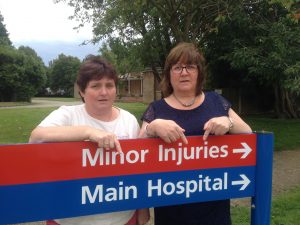Tonight saw a packed hall at The Maltings in Ely for the public meeting with the local NHS Clinical Commissioning Group about the leaked proposals for the future of the Minor Injury Units at Ely, Doddington and Wisbech.
Jessica Bawden, Director of Corporate Affairs at Cambridgeshire and Peterborough CCG, introduced the meeting. Tracy Dowling, the new chief officer for the CCG, gave a presentation about the review of the units, and GP member Dr Alex Manning also spoke.
Tracy described the challenge of implementing the recommendations of the national Keogh review of urgent and emergency care, in one of the most ‘challenging’ areas for NHS funding in the country. The Keogh standards for ‘urgent care centres’ aren’t compulsory yet, but they could become so in the next few years. They require extended opening hours and a level of access to facilities that the present Minor Injury Units don’t meet – and which could well be difficult for sparsely populated rural areas. Add that to the Clinical Commissioning Group’s projected budget overspend of £30 million this year, and it’s not hard to see that difficult times lie ahead.
Tracy outlined the six options the Clinical Commissioning Group have been discussing:
- Do nothing, and retain three Minor Injury Units that don’t meet Keogh requirements.
- Close all three Minor Injury Units and direct residents to their GPs or A&E departments.
- Reconfigure the existing service, using GPs, out of hours services, the Joint Emergency Teams, and Minor Injury Units to provide an integrated service.
- Close two of the three Minor Injury Units and keep the remaining one as a Keogh-compliant urgent care centre.
- Close one of the three Minor Injury Units and keep the remaining two as Keogh-compliant urgent care centres.
- Develop all three Minor Injury Units into Keogh-compliant urgent care centres.
All of these options have different implications, for costs, ways of working, and the experience of patients needing their services. Tracy was adamant that no decision has as yet been made. The Clinical Commissioning Group will continue to evaluate the six options into September or October, when any proposed changes would be submitted to the ‘NHS Senate’ for consideration. A public consultation exercise would take place from November or December to February, before a final decision was taken.
There was a lively question and answer session with some very insightful queries and comments. I pointed out how anodyne and bland the Clinical Commissioning Group’s recent dreadful Fit For the Future document had been, and how totally it had failed to address the real problems facing health care in Cambridgeshire and Peterborough that we had been discussing tonight. How would they improve their consultation processes? And would they make better use of relationships with councillors and others in the local community who could help publicise consultations and events, and make sure they were truly representative?
There was certainly an enthusiasm from those present to be more seriously consulted by the local NHS, and to be treated like grown-ups in the face of the very real problems facing our health services here in Cambridgeshire and Peterborough in the months and years ahead. I hope we’ll see more such meetings, and a Clinical Commissioning Group that is open and honest with local residents. It’s just a pity that the Clinical Commissioning Group had to be forced into this one by the leaking of their discussions.


So nothing has been desided. They need to consider the bigger picture .ELY and the surrounding are is expanding with an every growing population and the need for these services will increase.
Absolutely right, Sue. The point about the increasing population was made at the meeting. How to meet that demand with reducing funds will be a challenge. And of course, it is putting a strain on A&E services at Addenbrooke’s too which is already under huge pressure so sending people there instead will not help.
The removal of local services can always be justified on grounds of cost saving but the impact on patients’ health of travelling to Cambridge A&E is harder to quantify and gets left out of the calculation. Last week, following a fall, my wife’s 95 year old mother was taken by ambulance to Addenbrookes, where she spent a night in hospital only to be told that she had no significant injuries and could go back to her care home. The cost of two unnecessary ambulance trips and 36 hours in hospital is one thing, the adverse impact on her physical and mental condition is another. This is not cost effective or humane – it is wrong.
That’s not a good experience. Centralising health services may work well for large metropolitan areas, but in rural areas it can lead to gruelling experiences like the one your mother-in-law had.
One question I asked after last night’s meeting was what the experience of putting in place the Keogh recommendations was in other rural areas. We’re not the only ones, after all – what about Cumbria, Wales, the Yorkshire moors, Devon and Cornwall? There doesn’t seem to be any sharing of ideas, or marshalling of resources to lobby effectively for specifically rural concerns.